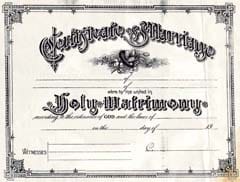Entitlement / Authorization
Entitlement or authorization means that an individual is either entitled or authorized to perform the solemnization of marriages by the ordaining entity and the respective state according to its state law.
The Universal Life Church ordains individuals without question as to beliefs, free of charge. This is the official authorization and entitlement granted to all ULC ministers. The church's authorization and entitlement is granted for life.
 Each state has laws which grant "state authorization or entitlement" to individuals to solemnize
marriages within its borders. States usually establish a broad category of individuals authorized to
solemnize marriages. The states leave most of the designation to the ordaining entity, church,
denomination or religious organization. Each state has its own guidelines and each minister is
responsible for knowing the law in each state in which he/she intends to officiate marriages. You can
read the requirements for the state you plan to perform a marriage in by reading the appropriate
state law page.
Each state has laws which grant "state authorization or entitlement" to individuals to solemnize
marriages within its borders. States usually establish a broad category of individuals authorized to
solemnize marriages. The states leave most of the designation to the ordaining entity, church,
denomination or religious organization. Each state has its own guidelines and each minister is
responsible for knowing the law in each state in which he/she intends to officiate marriages. You can
read the requirements for the state you plan to perform a marriage in by reading the appropriate
state law page.
Registration
Some states require that a minister register his/her ordination credential prior to solemnizing marriages. Some states require the production of a copy of the ordination credential and a Letter of Good Standing from the church or denomination. Some states require a special form or Affidavit to be completed by the minister and/or church/denomination. All of the state laws are known to the church and upon written request the church will supply all of the additional documentation as may be required of any of our ministers to register in any state.
This service is provided by the church for free although the individual is responsible for the cost of a replacement or new ordination credential. While the web site credential is sufficient in most states, many ministers want the official credential of the denomination because the web site version is not acceptable for official documentation to the states or local officials, such as nursing home directors or correctional facility staffs. The official credential is necessary for such purposes, so each minister ordained at the web site is encouraged to order the official credential upon ordination. Legally, ordination is attained by the submission of the legal name and address of an individual by the web site application. The official credential serves for more official documentation purposes. The web site credential is legal and valid; however, since such documents are easily forged, officials often want to see the official credential of the church.
Providing additional documentation for ministers is a costly and time consuming responsibility for the church, and additional documentation is not provided to everyone. Many times ministers want something personalized to them to make them feel validated or feel more "real" or legal. This is pure ego and nothing else. The church could not possibly satisfy the ego drives of its millions of ordained ministers; there simply is not the time or financial resources so it is not done. In time, ministers realize that credentials are just ego issues and true ordination is of the heart. We recognize that ego has its place and is necessary for everyone, but the church cannot invest financial resources in providing individualized documentation to everyone for personal uses.
Individuals who wish to officiate marriages are responsible for checking the laws of the states in which they plan to officiate marriages, to make certain that all required paperwork has been completed. The Universal Life Church is not responsible for the actions of individuals who perform marriages when they are not authorized by a state that has registration requirements which have not been fulfilled by the minister. Each minister is responsible for his/her own actions.
Legal Requirements
The "illegal solemnization of a marriage" is a crime in most states and the charge can be brought for many reasons such as age of the individuals involved, failure to secure a valid marriage license by the couple, or failure of the minister to comply with state law such as it may be. The charge may be civil or criminal depending upon the circumstances and the established intent. Ministers attempting to circumvent immigration laws through the solemnization of marriages for foreign nationals can be prosecuted criminally. The church advises its ministers to not engage in or have anything to do with such activities. Ministers are advised to solemnize marriages only when presented with a valid state issued license and that the marriage license is not expired. (Handfasting ceremonies are not legal marriages so ULC ministers are advised to not call such ceremonies marriages.)
Marriages are legal contracts and each state has both a valid and vested interest in the proper "contracting" of the marriage bonds. This is a serious legal action and not to be taken lightly. Surely there are love interests of the most sacred type, but there are civil issues that involve liability, entitlement, responsibility and the establishment of a line of decent within the newly formed family. Most ministers that actively conduct marriage ceremonies are covered by their employment by a local church or denomination for errors they may make. Few ministers actually carry insurance liability for malfeasance, misfeasance or nonfeasance. What those terms mean are:
- Malfeasance: Completely doing the wrong action.
- Misfeasance: Doing the wrong action.
- Nonfeasance: Failing to do an action.
Conducting a marriage is a once in a lifetime event and cannot be redone. If a minister fails to perform there is financial liability that may attach so it is vital that the minister feel comfortable with his/her abilities prior to accepting a request to solemnize a marriage.
In General
If the minister is certain of his/her authorization and entitlement by both the church and the state, then that individual may accept requests with self assurance that the ceremony will be performed with honor, respect, and dignity.
 The minister should invest a period of time to meet the couple and to share ideas as to what the
ceremony may be like. Couples often wish to make their own vows and this is to be encouraged. There are
NO MAGIC WORDS. The meaning of the vows is different for each couple. The standard..."Do you take... I
Do" is sufficient for the law, but it does not make for a memorable event although it may for some
couples. A simple Do You, I Do ceremony would be termed a "civil" ceremony. Invoking God or religious
issues would be termed a "religious" ceremony. Both are equally legal and valid.
The minister should invest a period of time to meet the couple and to share ideas as to what the
ceremony may be like. Couples often wish to make their own vows and this is to be encouraged. There are
NO MAGIC WORDS. The meaning of the vows is different for each couple. The standard..."Do you take... I
Do" is sufficient for the law, but it does not make for a memorable event although it may for some
couples. A simple Do You, I Do ceremony would be termed a "civil" ceremony. Invoking God or religious
issues would be termed a "religious" ceremony. Both are equally legal and valid.
The minister should have several vows to present to the couple so that a choice can be made, some of which we have outlines of on our wedding vows page. Oftentimes the location of the ceremony will have some impact on the choice and length of the ceremony. Whether the ceremony is to be conducted in a church, hall or correctional facility it is the minister's responsibility to handle all of the necessary requirements such as being presented with a valid state issued marriage license and to perhaps secure permissions from correctional staff for any special privileges as there may be need of. The minister is to maintain the solemnity of the situation and to conduct the ceremony with respect and honor.
The minister should discuss arrangements with the couple as to the presentation of the marriage license. It should be presented prior to the ceremony and the availability of two witnesses other than the couple and the minister must be assured. The minister's responsibility is to ensure that all of the required spaces on the marriage license are completed and signed by each individual required to sign.
After the Ceremony
After the ceremony, it is the minister’s vital responsibility to mail the completed marriage license to the appropriate state or county office. The minister should determine the state or county office and address to which it must be mailed in consultation with the couple. Many states impose a time requirement upon the minister for the mailing of the completed marriage license. THIS IS OF THE HIGHEST IMPORTANCE. The minister must never allow the completed license to leave his/her personal possession, and he/she is the only person who can mail in the license. It is an excellent professional practice for a minister to photocopy the completed license for his/her professional journal. In the case of a license being lost in the mail a photocopy would be of the greatest importance. These types of situations do arise, and a professional minister always maintains a journal of his/her ministerial activities.
It is crucial that you follow the instructions regarding when, how, and where to file the completed (witnessed, and signed by you) marriage license after the ceremony. Should you fail to properly record an executed marriage license/certificate, several actions may result, including but not limited to:
- Revocation of your permission to perform weddings
- Nullification of any weddings you may have performed
- Revocation of your good standing with the Universal Life Church
If you have any questions about when, where and how to have a marriage license recorded, please contact the clerk where the license was issued for details.
Suggested Outline
A suggested outline of activities is shown below:
- The minister accepts a request to solemnize a marriage.
- The minister meets with the couple to discuss time, arrangements, witnesses, selection of vows, minister's fee for the service, and deciding in advance when the fee is to be paid. It is not a professional practice to receive payment during the execution of the ceremony. The fee can be paid in advance, which is the best practice so that the couple does not have to deal with the issue after the ceremony. If not paid in advance, instruct the couple to give the money to the Best Man. It is the Best Man’s job to pay any outstanding fees.
- The minister provides various ceremony selections and the decision is made whether the ceremony will be religious in nature or a civil ceremony.
- Ceremony rehearsal (if needed or desired).
- The minister arrives at the designated location well in advance of the ceremony (at least a half hour.) The minister accepts the marriage license and makes certain there will be the necessary witnesses to sign the license. At the beginning of the ceremony, the minister stands in place to officiate the ceremony.
- After completion of the ceremony and exchange of vows, the minister signs the marriage license (if denomination is asked for: Universal Life). The minister hands the license to each witness in turn for his/her signature.
- The minister photocopies the license for his/her professional journal and prepares an envelope to mail the license to proper state/county office, then mails the license.

